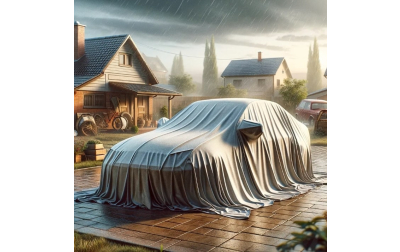How to Choose the Right RV: A Comprehensive Guide
Recreational vehicles (RVs) provide an opportunity for families and individuals to hit the open road and explore new destinations in comfort. Whether you're a seasoned RV veteran or a newcomer to the world of camping on wheels, choosing the right RV can be a daunting task. With so many different options available, it's important to do your research and consider your specific needs and preferences before making a purchase.
In this article, we'll provide a comprehensive guide to help you choose the right RV for you and your family. We'll cover the different types of RVs available, the key factors to consider when selecting an RV, and offer some tips for finding the best deal.
Types of RVs
One of the first decisions you'll need to make when choosing an RV is deciding which type is best for you. There are several different types of RVs available, each with its own unique set of features and benefits. Here's a breakdown of the most common types of RVs:
Class A Motorhomes: These are the largest and most luxurious RVs on the market. Class A motorhomes are built on a bus or truck chassis and feature a fully self-contained living space with all the amenities of home, including a kitchen, bathroom, and sleeping quarters. They're perfect for extended road trips and offer plenty of space for families and groups.
Class B Motorhomes: Also known as camper vans, Class B motorhomes are smaller and more compact than Class A motorhomes. They're built on a van chassis and offer a more basic level of amenities. While they may not have as much space as larger RVs, they're ideal for solo travelers or couples and are great for shorter trips or traveling in more urban areas.
Class C Motorhomes: Class C motorhomes are a middle ground between Class A and Class B motorhomes. They're built on a truck or van chassis and offer a bit more space and amenities than Class B motorhomes. They're a good option for families or groups who want a bit more room but still want a relatively compact RV.
Travel Trailers: Travel trailers are RVs that are towed behind a vehicle. They range in size from small, lightweight models to large, luxurious trailers that can sleep up to 10 people. Travel trailers offer a good balance of affordability and amenities, making them a popular choice for many families.
Fifth Wheel Trailers: Fifth wheel trailers are similar to travel trailers, but they're designed to be towed by a pickup truck. They have a special hitch that attaches to the bed of the truck, allowing for a more stable towing experience. Fifth wheel trailers are larger and more spacious than travel trailers, making them a good choice for extended trips or families with children.
Pop-Up Campers: Pop-up campers, also known as tent trailers, are the smallest and most basic type of RV. They're lightweight and easy to tow, making them a good option for those who want to try out RVing without committing to a larger, more expensive unit. Pop-up campers have canvas sides that fold out to create sleeping and living space, but they don't offer the same level of amenities as larger RVs.
Truck Campers: A truck camper is a type of recreational vehicle that is designed to be mounted on the bed of a pickup truck. It typically consists of a small living space with basic amenities, including a bed, kitchenette, and sometimes a bathroom. Truck campers are a popular choice for solo travelers or couples who want to explore the open road in a compact and convenient way. They offer a more mobile and flexible alternative to larger RVs and can be easily removed from the truck for use at campsites or for exploring on foot. Truck campers are typically lightweight and easy to tow, making them a good option for those who want to try out RVing without committing to a larger, more expensive unit.
Key Factors to Consider
Now that you have an idea of the different types of RVs available, it's time to start considering which one is right for you. Here are some key factors to consider when choosing an RV:
Size: The size of the RV is an important factor to consider, as it will determine how much space you have for living and storage, as well as how easy it is to drive and park. If you have a large family or plan on traveling with a group, you'll need a larger RV with more sleeping and living space. On the other hand, if you're a solo traveler or a couple, a smaller RV may be more practical.
Sleeping arrangements: The sleeping arrangements of an RV are also important to consider, especially if you have children or plan on hosting guests. Some RVs have bunk beds or convertible dinettes for extra sleeping space, while others have a separate bedroom with a queen or king-sized bed. Consider the number of people you'll be sleeping and the type of bedding you prefer when selecting an RV.
Amenities: The amenities of an RV can vary significantly depending on the model and price range. Some RVs come with a fully equipped kitchen, while others may only have a mini-fridge and microwave. Consider the level of comfort and convenience you want when selecting an RV, and be sure to compare the amenities of different models.
Towing capacity: If you plan on towing a travel trailer or fifth wheel trailer, it's important to consider the towing capacity of your vehicle. You'll need a vehicle with a strong enough engine and hitch to safely tow the RV, so be sure to check the manufacturer's recommendations before making a purchase.
Budget: Finally, consider your budget when selecting an RV. RVs can range in price from a few thousand dollars for a used pop-up camper to hundreds of thousands of dollars for a new, fully-equipped Class A motorhome. Determine how much you're willing to spend before shopping and stick to your budget to avoid overspending.
Tips for Finding the Best Deal
Once you've decided on the type of RV that's right for you, it's time to start shopping. Here are a few tips for finding the best deal on an RV:
Shop around: Don't be afraid to shop around and compare prices at different dealerships and online marketplaces. Prices can vary significantly depending on the location and condition of the RV, so be sure to do your research before making a purchase.
Consider buying used: Buying a used RV can be a great way to save money, especially if you're a first-time RV buyer. Just be sure to do a thorough inspection of the RV and get any necessary repairs or maintenance done before hitting the road.
Negotiate: Don't be afraid to negotiate the price of an RV, especially if you're buying used. The seller may be willing to come down on the price, especially if the RV has been on the market for a while.
Take advantage of discounts: Many dealerships and manufacturers offer discounts on RVs, especially during slower sales periods. Be on the lookout for sales and promotions and be sure to ask about any available discounts when shopping.
Conclusion
Choosing the right RV can be a daunting task, but with a bit of research and planning, you can find the perfect one for you and your family. Consider the size, sleeping arrangements, amenities, towing capacity, and budget when selecting an RV, and don't be afraid to shop around and negotiate to get the best deal. Happy RVing!




